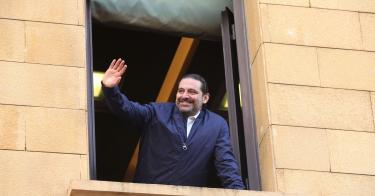The intensifying Saudi-Iranian cold war is severely disrupting Lebanese politics.
Lebanon’s prime minister, Saad Hariri, resigned suddenly on Nov. 4, blaming Iranian interference in Lebanese affairs and the internal threat posed by Hezbollah, Iran’s Lebanese Shiite surrogate.
Hariri’s resignation speech was delivered from Saudi Arabia, which reportedly had pressured him to step down after summoning him to travel there on short notice. (Hariri returned to Lebanon late Tuesday for the country’s Independence Day celebrations on Wednesday, and suspended his resignation.)
The Saudis, longtime backers of Hariri, Lebanon’s leading Sunni political leader, sought to collapse Lebanon’s fragile coalition government to delegitimize Hezbollah, the dominant faction within that government, and to push back against Iran and Hezbollah’s threatening activities in the region.
But Lebanese President Michel Aoun, who is aligned with Hezbollah, refused to accept Hariri’s resignation unless he presented it in person. Hariri then softened his position, saying that he might withdraw the resignation if Hezbollah respected Lebanon’s policy of staying out of regional conflicts.
That is highly unlikely. Hezbollah was created, bankrolled, armed, and trained by Iran, which has deployed it in Syria to prop up Bashar al-Assad’s regime. Hezbollah also has been training and equipping Houthi rebels in Yemen, which Riyadh is fighting against, and which has resulted in a stalemate in the brutal Yemeni civil war.
Iranian-backed Houthi rebels in Yemen fired a ballistic missile at the Saudi capital, Riyadh, on Nov. 4. The Saudis launched a U.S.-made Patriot missile to destroy the incoming missile, which fell near King Khalid International Airport. Saudi Crown Prince Mohammed bin Salman charged that Iran had supplied the missile to the Houthis and that Iran’s direct aggression “may be considered an act of war against the kingdom.”
Adding to the volatility, Israel also has been signaling that it will not tolerate a Hezbollah military buildup near its border with Syria. It warned Lebanon that it would suffer heavy consequences in another war, because Hezbollah is part of the government.
Hezbollah provoked a 2006 war with Israel, and Jerusalem warned that another war would be much more harmful to Lebanon’s interests.
Both Saudi Arabia and Israel, which have been drawn together by the threat posed by Iran, are trying to drive a wedge between Hezbollah and other Lebanese factions by stressing that Hezbollah’s aggressive efforts to promote Iran’s agenda undermine Lebanese national interests.
The situation only worsened when Saudi Arabia ordered all Saudi citizens out of Lebanon on Nov. 6, after having accused Iran of declaring war on the Saudi nation.
In response, Hezbollah leader Hassan Nasrallah condemned Saudi actions. “It is clear that Saudi Arabia and Saudi officials have declared war on Lebanon and on Hezbollah in Lebanon,” he said, adding that Saudi actions are purposefully inciting Israel to attack Lebanon.
The State Department declared U.S. support for Lebanon and condemned “any actions that could threaten [its] stability.”
The statement indirectly acknowledged the illegitimacy of Hezbollah by declaring: “The United States firmly reiterates that the Lebanese armed forces and other Lebanese state security forces are the only legitimate security authorities in Lebanon.”
If the crisis is not resolved, Saudi Arabia is likely to escalate economic pressure on Hezbollah, rather than take military action. Riyadh could resort to expelling Lebanese workers from the kingdom, cutting off diplomatic relations, or even sanctioning Lebanese remittances from the Gulf, which would cripple the Lebanese economy.
It is in the national interest of the U.S. to support peace and stability in Lebanon, but also to prevent Hezbollah from threatening U.S. allies both inside and outside of Lebanon. Lebanon’s sovereignty will be at risk until Hezbollah has been disarmed and demobilized.
That will be fiercely resisted by Hezbollah and will not happen anytime soon. But a path has been laid out by U.N. Security Council Resolution 1701, which endorsed the cease-fire that ended Hezbollah’s war against Israel in 2006.
The resolution called for the full implementation of the 1989 Ta’if Accords, which ended the Lebanese civil war and required the disarmament of all armed groups in Lebanon, so that “there will be no weapons or authority in Lebanon other than that of the Lebanese state.”
In order to further pressure Hezbollah to abide by international agreements and demobilize, Washington should sanction more top Hezbollah figures, as well as Iran for supporting Hezbollah and undermining Lebanese sovereignty. Washington should back its allies and warn Iran that it will pay an increasingly steep price for its hostile policies.
In addition to its subversion of Lebanese sovereignty, Tehran sought to assassinate the Saudi ambassador in Washington in 2011 and sacked the Saudi Embassy in Tehran in 2016.
Now, Iran is turning Yemen into a base for terrorism against Saudi Arabia, in much the same way that it turned Lebanon into a base for terrorism against Israel.
Hezbollah also was implicated in the 2005 assassination of Lebanese Prime Minister Rafik Hariri, the father of Saad Hariri, the current prime minister, which is one reason that the younger Hariri has said he fears for his safety inside Lebanon.
Hariri has now returned to Lebanon, but thanks to Iran and its efforts to intimidate Lebanon and Saudi Arabia, his independence, and that of Lebanon itself, have been increasingly diminished.
This piece originally appeared in The Daily Signal



